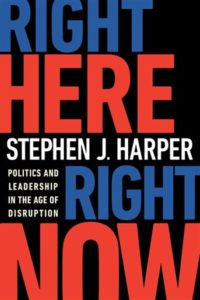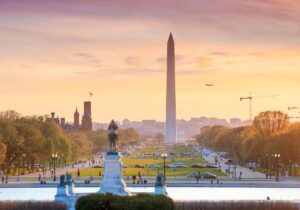The crisis in political conservatism has now reached such a crescendo that hardly a day passes in which a professional thinking person does not wonder if conservatism in America is now unrecoverable. Conservatism’s principles seem so trampled underfoot by a resurgent populism that one wonders how long until we learn that Reagan, or Bush, were early cultural Marxists. And so, how unexpected, to imagine learning about conservatism from that socialist dystopia to America’s north, Canada. That is just what its former Conservative prime minister, Stephen Harper, argues is needed in his new book Right Here, Right Now: Politics and Leadership in an Age of Disruption. His book, part memoir from his time as a “populist” conservative party leader is branded as a “manual for conservative statecraft in a populist age.” The Americans may not want our steel or our dairy, but they just may want our conservatism. Harper calls it a “reformed democratic capitalism, with renewed working-class opportunity and greater community cohesion,” a “bridge between populism and establishment.”
It should immediately be said this is a book for conservatives. If you count yourself among the progressive liberals, social democrats, or even—here in Canada—red Tories, you will find very little in this book that is not scorn and condescension. I do not mean to be trite. It was genuinely surprising to me that after sober distance from the partisan politics of his time in office, the prime minister seemed able to muster such extraordinary empathy and understanding of populist Trump supporters, but almost none for his once-political colleagues. “They” are painted with the broadest brush strokes imaginable: “much of Western academia…fixated on communism,” “technocrats,” “globalists,” “opponents on the left [who] are the real threat to the future of our economies and the interests of our working citizens,” “abstract intellectualism,” “back to the future socialist-protectionists,” “alienists,” or simply “the modern left” stuck in its “intellectual adolescence.” The essence, he says, of the modern left is “an allergy to our society, its underlying ideas, and core institutions. On the hard left, it seeks their destruction.” They are “always willing to jump on the next trendy idea, however vacuous.”
 Only one small passage refers to Barack Obama as “among the most impressive leaders I have known,” one of the “best briefed and most articulate individuals in the room.” But, he hastens to add, the “modern left” has moved radically beyond what he can now only in retrospect call the moderate positions of the Obama administration.
Only one small passage refers to Barack Obama as “among the most impressive leaders I have known,” one of the “best briefed and most articulate individuals in the room.” But, he hastens to add, the “modern left” has moved radically beyond what he can now only in retrospect call the moderate positions of the Obama administration.
Even a conservative might find this goes beyond some light catharsis to actual falsehood. Is it, indeed, the case that Western academia is a “bastion of communism” who exercises power through education, media, the entertainment, and cultural industry? The crisis in higher education is now well documented, but to imagine it is an entirely state-subsidized fifth column for cultural Marxists is, I think, going far beyond empirical reality and dabbling in the very thing Harper signals as the Achilles heel of conservatism: ideology.
Stephen Harper wants to make it very clear he is not a theorist or an ideologue. These are very, very bad words in his world of conservatism, and probably one of the most consistent themes of his book. “Policy-making does not occur within a textbook version of reality,” he says. “Real-life implementation was far messier and more complicated than the theorists had assumed,” with too much “technocratic certainty” and a need to return to real “issues, not the theorems in textbooks.” His dismissal of globalism is in part because it is a “concept,” whereas nationalism and the nation-state is a “concrete reality.” Policymakers for too long have made policy ideologically so that when it is not working, you do not fix the policy but “denounce the public.” Our elite institutions are run by “abstract intellectualism, not merely unrooted in experience but repelled by it.”
By contrast, he describes populist conservatism “as rooted not in abstract ‘first principles’ but in real-world experience applied to the needs of regular people.” He calls this pragmatism the “essence of conservatism.” “Real conservatism [emphasis added] has a preference for the empirical over the theoretical.”
Ideological politics, conservative kinds among them (he spares a critical word or two for libertarianism on this front), often “claim to know the answer before the question has even been posed… It is all so predictable… Much of their ‘evidence’ is little more than faith-like assertion from weak, non-empirical academic disciplines.”
Although John Maynard Keynes makes an appearance, with some appreciation for the man (“Keynes was no socialist”) if certainly not his disciples, one axiomatic quote from Keynes which seemed to haunt this unrepentant suspicion of ideology was that of “practical men” who believe themselves exempt from ideology but in fact are slaves of some “defunct economist.”
It is hard to find a moral center to this conservatism, after all, with all this derision of theory, but perhaps that is the point. “Moral centres” produce the kind of blinkered politicians that cannot see “the real world” and are unable to make the pragmatic concessions that are necessary. But, necessary for what? Even in his chapters on trade and the “art of the deal,” Harper surprises by offering a pragmatic, conservative defense of supply management, arguing that capitalism is a “means” not an “end.” Fair enough, but what, then, is that end? A flourishing society? A productive one? Healthy families? That all sounds wonderful, but the devil is in the details. As I have argued elsewhere, Abu-Bakr al-Baghdadi wants you to flourish too. Now what?
It is in his chapter on immigration that an unapologetic set of values appears, something that might even be mistaken as “first principles.” There, Harper reflects on how his government rewrote the citizenship guide for Canada’s citizenship test, “expanding the sections on Canadian history, institutions, and values… Our ‘values’ focus was on things that are almost universally accepted in Canada.” The closest we come to national values as the lodestar for all this pragmatism is a kind of majoritarian consensus, cleaving closely to the history, tradition, and laws of Canada. That, at least, is recognizably conservative.
This is also where his grudging respect for President Trump comes in, not really as a person (he calls Trump “crude”) but as a politician who sensed and capitalized on this populist zeitgeist. It is well understood that Trump is difficult to ideologically capture, in part because of his style and in part because of his pragmatism, the latter feature which Harper appreciates.
Harper’s explanation of Trump’s populism is, as he says, “not new.” His explanations are those of an economist (which he is), largely driven by the “have-nots” of our era of globalization, the blue-collar, middle-class, “regular” folks who have been left out of the latest bonanza of prosperity. Leaving aside the economics of this for the moment, which are certainly contested, Harper does touch on some of the emerging ideas about tribalism, what he calls (following David Goodheart) people who are Somewhere and people who are Anywhere.
“Somewheres” are the rooted, regular, working-class families who often don’t leave their hometowns, aspire to some, but not elite, education, and have “localist” values. Dislocation profoundly affects them. “Anywheres” are the global elite, the technocratic order that feels less attachment to the local and more affinity for the global. They are cosmopolitan, and they “probably read The Economist.” Interestingly, Thomas Friedman is singled out as such an example, a “flat worlder” despite having put just such a distinction in place in his much older book The Lexus and the Olive Tree. We could also think of Manuel Castell’s theory (yes, theory) of The Rise of the Network Society, or, more plainly, Benjamin Barber’s Jihad vs. McWorld. The list goes on. And the sheer volume of these approaches suggests there is, indeed, something there, though the explanations are hardly original to Trump or to Brexit, and in fact as a framework predates 9/11 if not the end of the Cold War. This is the kind of thing you learn, I suppose, if you study theory in a university classroom.
None of which is to say it’s necessarily wrong. Especially when it comes to trade and trade negotiations, Harper shows the kind of insight that makes the book worth the price of admission. The tradeoffs, especially between Somewheres and Anywheres, and how and for whom trade deals are struck, are a constant feature of Harper’s analysis. There are winners and there are losers in every trade deal, he candidly admits, and there is no simple logic at work when it comes to what to regulate, what to centralize, what to protect, and what to open up. Yes, over the long-term Harper, who is an economist, admits markets tend to make an economy work; they tend to create greater prosperity. But prosperity is not always the only goal, and the costs of “creative destruction” can sometimes be too high for a democratic state (or its parties preferring power) to bear.
Here, in these chapters on markets and trade, Harper’s localist tone, economic expertise, and political wisdom are best displayed. One may not agree with his specific politics or even the deals he struck during his time in office (nearly 43 of them), but the humility of his approach to trade, and the tender tone which he obviously takes with the importance of how these deals affected people, show a man most at home meeting and greeting constituents, and working late hours to get what he saw, for them, was their best chance at prosperity.
Here then, also, may be the best advice for conservatives from Harper’s mini-memoir. Not, in my opinion, his reductive dismissal of whatever we call his opponents, or his suspicion of grand strategy or theory, or even his somewhat warmed-over analysis of populism, but the conviction that politics must be more limited than we often want to admit, and that this limitation creates the conditions under which diversity is both hedged and flourishes. Ideology is most dangerous in politics, specifically, not because people do not necessarily have underlying presumptions and beliefs, but because politics needs to be a capacious sphere pragmatically concerned with securing as best it can the framework within which other spheres of life can succeed on their own terms. Harper is bullish on civil society, although he offers very little toward its atrophy, but sees it as the essential source of renewal.
Is there help here for America’s Republicans, who for the first time can be said to be both in power and in the wilderness? I think what Harper did, not so much how he talks about it, provides a model. The time may have indeed come to “stop obsessing about the flaws of Trump and the Brexiteers,” but then it has almost certainly come to also stop obsessing about the fringe of whatever we call the modern left and focus on our own reform. The demolition of modern conservatism isn’t just, or even mostly, a story about what was done to us, but what we did to ourselves. We could do worse than turn to Stephen Harper to learn about how and why this was, and certainly much worse than to think about where to go from here.
—
Robert Joustra is an associate professor of politics and international studies and director of the Centre for Christian Scholarship at Redeemer University College outside Toronto, Canada. He is editor of Public Justice Review at the Center for Public Justice, an editorial fellow with The Review of Faith & International Affairs and author of several books, including The Religious Problem with Religious Freedom (Routledge, 2017) and, with Alissa Wilkinson, How to Survive the Apocalypse: Zombies, Cylons, Faith and Politics at the End of the World (Eerdmans, 2015). He tweets sporadically @rjoustra.
Photo Credit: Canadian flag at Rogers Pass, British Columbia. By waferboard, via Flickr.







 Sponsor a student for Christianity & National Security 2024
Sponsor a student for Christianity & National Security 2024